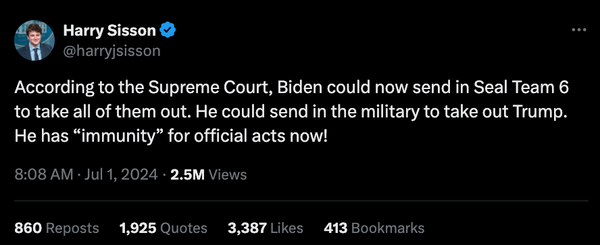The claim that the U.S. Supreme Court made a sitting president immune from prosecution for ordering elements of the military — such as Seal Team 6 — from killing a political opponent arose as a common talking point in the aftermath of the high court’s July 1, 2024, ruling in Trump v. United States:

While several Supreme Court justices agree that the decision could provide the immunity described in viral tweets like the one shown above, the decision did not explicitly argue that this power existed. That language stems from Justice Sonya Sotomayor’s dissenting opinion, but carries no legal weight, and references to an exchange between a Trump lawyer and an appellate judge involved in the case.
Trump v. United States
Trump v. United States arose in response to a federal indictment issued against the former president in August 2023 that alleged Trump conspired to “defraud the United States by using dishonesty, fraud, and deceit to impair, obstruct, and defeat the lawful federal government function by which the results of the presidential election are collected, counted, and certified by the federal government” following his defeat in the 2020 presidential election.
In October 2023, Trump’s lawyers asked District of Columbia Circuit Judge Tanya S. Chutkan to throw out the case, in part based on the premise that the charges against Trump related to actions he took as president which, they argued, were “absolutely immune from prosecution.” Legal precedent favored at least some presidential immunity for “official acts” taken as president on the premise that fear of prosecution would prevent swift and decisive presidential action.
Chutkan declined to dismiss the case, and Trump’s lawyers appealed her ruling to the U.S. Court of Appeals for the D.C. Circuit, putting Trump’s motion to dismiss in the hands of a panel of three appellate judges. The Seal Team 6 assassination example was first raised at this stage of the legal proceedings during oral arguments, as reported by The Washington Post in January 2024:
“A president could sell pardons, could sell military secrets, could order SEAL Team 6 to assassinate a political rival?” Judge Florence Y. Pan asked. “Would such a president be subject to criminal prosecution if he’s not impeached?”
D. John Sauer, representing Trump, insisted that for any crime connected to a president’s “official duties,” the “political process” of impeachment and conviction by the Senate “would have to occur” before prosecution. He predicted that if a president was involved in murder, he would be “speedily” impeached.
Ultimately, the panel of judges rejected that argument. Trump’s team again appealed, and in February 2024 the Supreme Court agreed to hear the case. In a 6-3 decision written by Chief Justice John Roberts, the court largely supported Trump’s broad view of immunity with some exceptions.
Official Actions?
Roberts argued that acts taken by a president in their “core constitutional capacity” are immune from prosecution, and that “official actions” taken by a president are entitled to “presumptive immunity.” Roberts stated that this immunity did not carry over to “unofficial” acts:
The President enjoys no immunity for his unofficial acts, and not everything the President does is official. The President is not above the law. But under our system of separated powers, the President may not be prosecuted for exercising his core constitutional powers, and he is entitled to at least presumptive immunity from prosecution for his official acts.
For most of the questions of immunity related specifically to Trump’s 2020 election case case, Roberts required the lower courts to start from the beginning, in essence, and make a ruling on the official or unofficial nature of Trump’s actions. In making that determination, Roberts stated that “courts may not inquire into the President’s motives,” as this would “risk exposing even the most obvious instances of official conduct” to legal scrutiny “on the mere allegation of improper purpose.”
The “core constitutional powers” for which Presidents have absolute immunity are those explicitly stated in Article II of the Constitution — things like serving as commander in chief of the United States armed forces.
Sotomayor, in her dissenting opinion, argued that the court had effectively created “a law free zone around the President.” She referenced the Seal Team 6 example, stating her view that Roberts’ logic would exempt a president from prosecution for using the military to kill political opponents, in part because commanding the military is a core constitutional role:
This new official-acts immunity now “lies about like a loaded weapon” for any President that wishes to place his own interests, his own political survival, or his own financial gain, above the interests of the Nation. The President of the United States is the most powerful person in the country, and possibly the world.
When he uses his official powers in any way, under the majority’s reasoning, he now will be insulated from criminal prosecution. Orders the Navy’s Seal Team 6 to assassinate a political rival? Immune. Organizes a military coup to hold onto power? Immune. Takes a bribe in exchange for a pardon? Immune. Immune, immune, immune.
The Bottom Line
A dissenting view carries no legal or precedent-setting weight, and as a result it is incorrect to say the ruling made sitting presidents immune from being prosecuted for carrying out military assassinations of political rivals. Technically and thankfully, that question remains untested.
It is, however — according to dissenting Supreme Court justices and legal experts — entirely plausible that such conduct would be protected under the high court’s broadened view of presidential immunity.
Sources:
“Article II.” LII / Legal Information Institute, https://www.law.cornell.edu/constitution/articleii. Accessed 1 July 2024.
“Dissenting Opinion.” LII / Legal Information Institute, https://www.law.cornell.edu/wex/dissenting_opinion. Accessed 1 July 2024.
Feuer, Alan, and Charlie Savage. “Trump Seeks Dismissal of Federal Election Case, Claiming Immunity.” The New York Times, 5 Oct. 2023. NYTimes.com, https://www.nytimes.com/2023/10/05/us/politics/trump-jan-6-case-dismissal.html.
Millhiser, Ian. “The Supreme Court’s Trump Immunity Decision Is a Blueprint for Dictatorship.” Vox, 1 July 2024, https://www.vox.com/scotus/358292/supreme-court-trump-immunity-dictatorship.
“Read the Indictment.” AP News, https://apnews.com/trump-election-2020-indictment. Accessed 1 July 2024.
Trump v. United States. 1 July 2024, https://www.supremecourt.gov/opinions/23pdf/23-939_e2pg.pdf.
Weiner, Rachel, et al. “Judges Skeptical That Trump Is Immune from Jan. 6 Prosecution.” Washington Post, 10 Jan. 2024. www.washingtonpost.com, https://www.washingtonpost.com/dc-md-va/2024/01/09/trump-immunity-appeals-court-arguments/.












